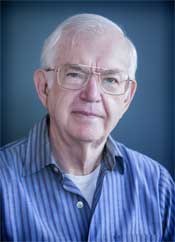 KINGSTON, R.I. — June 12, 2012 — University of Rhode Island professor George Willis has spent more than 40 years researching ways to advance knowledge of education, and those efforts recently earned him national recognition from the American Education Research Association.
KINGSTON, R.I. — June 12, 2012 — University of Rhode Island professor George Willis has spent more than 40 years researching ways to advance knowledge of education, and those efforts recently earned him national recognition from the American Education Research Association.
Willis is a 2012 recipient of the AERA’s Division B Lifetime Achievement Award, an honor that was formally announced April 14 at the organization’s annual meeting in Vancouver, British Columbia.
Also receiving a lifetime achievement award was Cheryl Craig, of the University of Houston.
“I had kind of a funny reaction,” Willis said. “I knew I was under consideration, but the committee’s deliberations dragged on more than two months longer than expected, so I surmised there was some kind of deadlock. I wasn’t really expecting the award, so when they finally told me, my feeling was mostly relief. Only later did it hit me how much my work must have influenced many Division B colleagues across the United States and elsewhere. The validation is gratifying.”
Willis has spent most of his professional life trying to use qualitative research to improve the American educational system. He is the author of Qualitative Evaluation: Concepts and Cases in Curriculum Criticism (1978) and Curriculum: Alternative Approaches, Ongoing Issues (with Colin March, 1995), which were described by Arizona State University professor emeritus Thomas Barone as “among the most important in the field of curriculum studies over the last 50 years.”
Many of his efforts have been met with resistance as the desire for standardized testing and calculable progress has grown.
“The nation is now undergoing a fetish with standardized testing and accountability,” he said. “It expects to get the improvements it wants through the use of what is, in effect, an engineering model, but sound educational practice is consistent with an organic model. So people who want to centralize education or take a one-size-fits-all approach do not understand what education fundamentally is, strange as that seems in a nation where almost every adult has had considerable experience with schooling.
“They’re looking for a silver bullet that doesn’t exist.”
Willis said the classic approach to educational research is based on the scientific method, seeking a curriculum that produces results and then using control groups to measure its true effectiveness.
Willis understands the desire to use such an approach, but says it is imperfect.
“It’s all perfectly logical,” he says. “The problem is it doesn’t cover personal feelings inside of people.”
Instead, Willis argues the task of education studies professionals is one of bringing three focal points — the nature of subject matter, the nature of the individual — and the nature of the environment) into an appropriate balance. It is a daunting task, to be sure.
“Today everybody wants to improve education, but very few are willing to do the hard intellectual work required in the first place,” he said. “Constantly upping stress levels for students and teachers to improve test scores is a sure loser.”
URI Department of Communications & Marketing photo by Michael Salerno Photography.

